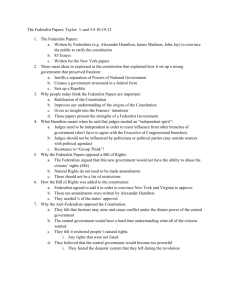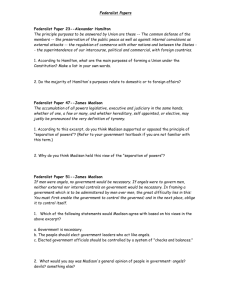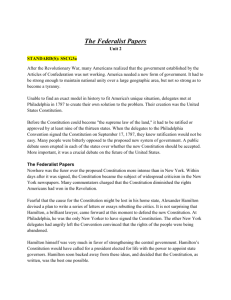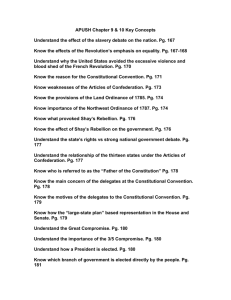The Federalist Papers - Bishop Seabury Academy
advertisement
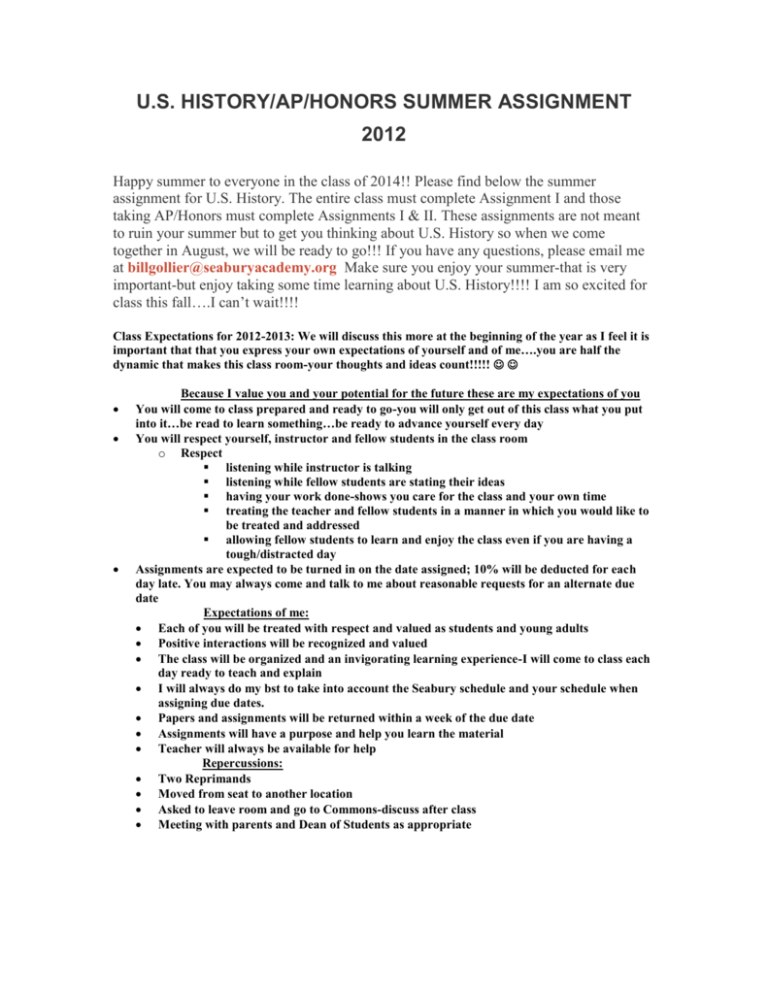
U.S. HISTORY/AP/HONORS SUMMER ASSIGNMENT 2012 Happy summer to everyone in the class of 2014!! Please find below the summer assignment for U.S. History. The entire class must complete Assignment I and those taking AP/Honors must complete Assignments I & II. These assignments are not meant to ruin your summer but to get you thinking about U.S. History so when we come together in August, we will be ready to go!!! If you have any questions, please email me at billgollier@seaburyacademy.org Make sure you enjoy your summer-that is very important-but enjoy taking some time learning about U.S. History!!!! I am so excited for class this fall….I can’t wait!!!! Class Expectations for 2012-2013: We will discuss this more at the beginning of the year as I feel it is important that that you express your own expectations of yourself and of me….you are half the dynamic that makes this class room-your thoughts and ideas count!!!!! Because I value you and your potential for the future these are my expectations of you You will come to class prepared and ready to go-you will only get out of this class what you put into it…be read to learn something…be ready to advance yourself every day You will respect yourself, instructor and fellow students in the class room o Respect listening while instructor is talking listening while fellow students are stating their ideas having your work done-shows you care for the class and your own time treating the teacher and fellow students in a manner in which you would like to be treated and addressed allowing fellow students to learn and enjoy the class even if you are having a tough/distracted day Assignments are expected to be turned in on the date assigned; 10% will be deducted for each day late. You may always come and talk to me about reasonable requests for an alternate due date Expectations of me: Each of you will be treated with respect and valued as students and young adults Positive interactions will be recognized and valued The class will be organized and an invigorating learning experience-I will come to class each day ready to teach and explain I will always do my bst to take into account the Seabury schedule and your schedule when assigning due dates. Papers and assignments will be returned within a week of the due date Assignments will have a purpose and help you learn the material Teacher will always be available for help Repercussions: Two Reprimands Moved from seat to another location Asked to leave room and go to Commons-discuss after class Meeting with parents and Dean of Students as appropriate Assignment I ENTIRE CLASS MUST DO THIS ASSIGNMENT The Federalist Papers A nation without a national government is, in my view, an awful spectacle. --Alexander Hamilton, The Federalist Papers, No. 85 After the Revolutionary War, many Americans realized that the government established by the Articles of Confederation was not working. America needed a new form of government. It had to be strong enough to maintain national unity over a large geographic area, but not so strong as to become a tyranny. Unable to find an exact model in history to fit America's unique situation, delegates met at Philadelphia in 1787 to create their own solution to the problem. Their creation was the United States Constitution. Before the Constitution could become "the supreme law of the land," it had to be ratified or approved by at least nine of the thirteen states. When the delegates to the Philadelphia Convention signed the Constitution on September 17, 1787, they knew ratification would not be easy. Many people were bitterly opposed to the proposed new system of government. A public debate soon erupted in each of the states over whether the new Constitution should be accepted. More important, it was a crucial debate on the future of the United States. The Federalist Papers No where was the furor over the proposed Constitution more intense than in New York. Within days after it was signed, the Constitution became the subject of widespread criticism in the New York newspapers. Many commentators charged that the Constitution diminished the rights Americans had won in the Revolution. Fearful that the cause for the Constitution might be lost in his home state, Alexander Hamilton devised a plan to write a series of letters or essays rebutting the critics. It is not surprising that Hamilton, a brilliant lawyer, came forward at this moment to defend the new Constitution. At Philadelphia, he was the only New Yorker to have signed the Constitution. The other New York delegates had angrily left the Convention convinced that the rights of the people were being abandoned. Hamilton himself was very much in favor of strengthening the central government. Hamilton’s Constitution would have called for a president elected for life with the power to appoint state governors. Hamilton soon backed away from these ideas, and decided that the Constitution, as written, was the best one possible. Hamilton published his first essay in the New York Independent Journal on October 27, 1787. He signed the articles with the Roman name "Publius." (The use of pseudonyms by writers on public affairs was a common practice.) Hamilton soon recruited two others, James Madison and John Jay, to contribute essays to the series. They also used the pseudonym "Publius." James Madison, sometimes called the Father of the Constitution, had played a major role during the Philadelphia Convention. As a delegate from Virginia, he participated actively in the debates. He also kept detailed notes of the proceedings and drafted much of the Constitution. Unlike Hamilton and Madison, John Jay of New York had not been a delegate to the Constitutional Convention. A judge and diplomat, he was serving as secretary of foreign affairs in the national government. Between October 1787 and August 1788, "Publius" wrote 85 essays in several New York newspapers. Hamilton wrote over 60 percent of these essays and helped with the writing of others. Madison probably wrote about a third of them with Jay composing the rest. The essays had an immediate impact on the ratification debate in New York and in the other states. The demand for reprints was so great that one New York newspaper publisher printed the essays together in two volumes entitled The Federalist, A Collection of Essays, written in favor of the New Constitution, By a Citizen of New York. By this time the identity of "Publius," never a well-kept secret, was pretty well known. The Federalist, also called The Federalist Papers, has served two very different purposes in American history. The 85 essays succeeded by helping to persuade doubtful New Yorkers to ratify the Constitution. Today, The Federalist Papers helps us to more clearly understand what the writers of the Constitution had in mind when they drafted that amazing document 200 years ago. The complete text of Federalist Papers: http://www.foundingfathers.info/federalistpapers/ A Guide for Government What follows are quotations from several essays in The Federalist Papers. Please read the given selection of the Federalist Papers (see link above) and then answer the questions. Federalist Paper 23--Alexander Hamilton The principle purposes to be answered by Union are these -- The common defense of the members -- the preservation of the public peace as well as against internal convulsions as external attacks -- the regulation of commerce with other nations and between the States -- the superintendence of our intercourse, political and commercial, with foreign countries. 1. According to Hamilton, what are the main purposes of forming a Union under the Constitution? Make a list in your own words. 2. Do the majority of Hamilton's purposes relate to domestic or to foreign affairs? 3. Which one of Hamilton's purposes do you think is the most important for the United States today? Explain your answer in about 100 words. Federalist Paper 47--James Madison The accumulation of all powers legislative, executive and judiciary in the same hands, whether of one, a few or many, and whether hereditary, self appointed, or elective, may justly be pronounced the very definition of tyranny. 1. According to this excerpt, do you think Madison supported or opposed the principle of "separation of powers"? (Refer to your government textbook if you are not familiar with this term.) 2. Why do you think Madison held this view of the "separation of powers"? 3. In about 100 words, describe a government in which all legislative, executive and judicial power is in the hands of one person or a single small group. Federalist Paper 72--Alexander Hamilton The original intent of the Constitution was to place no limit on the number of times an individual could be elected president. However, after Franklin D. Roosevelt won four presidential elections in a row, a constitutional amendment (the 22nd) was passed limiting a person to two terms as president. In the following selection, Hamilton argues against limiting the number of presidential terms. [An] ill effect of the exclusion would be depriving the community of the advantage of the experience gained by the chief magistrate in the exercise of his office. That experience is the parent of wisdom is an adage, the truth of which is recognized by the wisest as well as the simplest of mankind. What more desirable or more essential than this quality in the government of nations? For Discussion 1. What argument does Hamilton give against limiting the number of times a person may be elected president? 2. What could have been one of the arguments used by those who proposed the 22nd Amendment? Individual Assignment President Reagan remarked that there should not be a limit on the number of times a person may serve as president. Do you agree we should go back to the original intent of the Constitution and allow individuals to be elected for any number of presidential terms? Think if it is a very popular president. Explain your answer in about 100 words. Federalist Paper 78--Alexander Hamilton "If then the courts of justice are to be considered as the bulwarks of a limited constitution against legislative encroachments, this consideration will afford a strong argument for the permanent tenure of judicial offices, since nothing will contribute so much as this to that independent spirit in the judges, which must be essential to the faithful performance of so arduous a duty. This independence of the judges is equally requisite to guard the constitution and the rights of individuals from the effects of . . . designing men." 1. What does Hamilton mean by "the permanent tenure of judicial offices"? Does Hamilton support or oppose this idea? 2. What does Hamilton mean when he says that an "independent spirit in the judges" is essential for them to do their duty? 3. Write a letter of about 100 words to the editor of a newspaper agreeing or disagreeing with the view that the U.S. Supreme Court justices should be elected for limited terms of office. DUE DATE: Due the first day of classes, August 16th 2012 Grading Rubric: Questions 1 and 2 of each section: 5 points Question 3 of each section: 15 Punctuality: 10 Assignment II U.S. AP/Honors You must choose a book (either fiction or non-fiction) to complete the first part of the assignment. Please see the book list below for suggestions. You must get permission if you choose a book that is not on the list. After reading your chosen book, you are to complete the following questions Part A in one essay then answer Part B in a separate writing-thus, you will have two PART A: 1. Explain the historical context of your chosen book and how it represents an era or epoch in American History. 2. Discuss the author’s point of view (P.O.V.). Explain any positive or negative bias to the topic presented and the environment in which it lies. 3. Time written: How does the reflection of the era in which the book was actually written impact the story? How do the author’s life experiences affect what was written? Examples: 1. The Crucible by Arthur Miller was written in 1952 and is seemingly about the Salem Witch Trials. However, he wrote the play during McCarthyism, a time many people referred to as a Witch Hunt. Coincidence? 2. Harper Lee, a southern woman, wrote To Kill a Mockingbird (published in 1960). How does this story, set in the 1930s, reflect what was happening in the United States in the 1950s? If your chosen book was written during the actual time period it is presenting, what was its impact on the audience of the day? Also consider, if relevant, the role of the individual or the impact of the event on the time period. 4. Why was it written? In other words was there something in the author’s time that led to the writing of the text? Why do you think the author wrote this book? PART B. In this section your choices must “dovetail” or reflect an aspect of the same period as the text. Choose any artwork from the same time period as the book. Please provide a copy or accurate location of said artwork so I can also view it to allow for grading. Choose an example of any music, song, or poem and remember to provide a copy or easy access to what you chose to enable me to fairly grade your choice. Once you’ve chosen the artwork and music, answer the following in a paragraph: 1. How do art (painting, sculpture, and architecture), literature, and music express a time period’s essence? (i.e. How do these items “teach” people not only of that time, but those far-removed, the history of the time?) Be specific with your rationale!!! GRADING RUBRIC: Part A. Essay=60 points Part B. Art & Music=20 points 1. Historical content-_____/10 2. Author’s POV-______/10 3. Time written-______/10 4. Why?-______/10 5. Grammatically correct-______/10 6. Originality of thought-______/10 7. Total: ______60 1. Artwork-_____5 2. Music-_____5 3. Explanation-_____10 4. Total: ______20 Punctuality: 20 Total Assignment II: 100 DUE DATE: Due the first day of classes, August 16th 2012 A /Honors U.S.History Summer Assignment Book Choices. Please email Mr. Gollier for approval if you choose a book that is not on this list Anderson, Sherwood—Winesburg, Ohio Atwood, Margaret-A Handmaid’s Tale Auch, Mary Jane—Ashes of Roses Bender, Christine E.—Challenge the Wind Beard C. & M. An Economic Interpretation of the Constitution, Boyd, James—Drums Bradbury, Ray—Fahrenheit 451 Cannon, A. E.—Charlotte’s Rose Carson, R Silent Spring, Carter, Forrest—The Education of Little Tree Carter, Jimmy—The Hornet’s Nest Cather, Willa—My Antonia; O’Pioneers Cooper, James Fennimore—The Last of the Mohicans; The Deerslayer Crane, Stephen—The Red Badge of Courage Curtis, Christopher Paul—Bud, Not Buddy Davis, Ossie—Just Like Martin Dreiser, Theodore—An American Tragedy; Sister Carrie Fast, Howard—April Morning Fitzgerald, F. Scott—The Great Gatsby Flagg, Fannie—Fried Green Tomatoes Frazier, Charles—Cold Mountain Gaines, Ernest J.—The Autobiography of Miss Jane Pittman Garrison, Jim—On the Trail of Assassins Hamill, Pete—Forever Hansberry, Lorraine—A Raisin in the Sun Hawthorne, Nathaniel—The Scarlet Letter Heller, Joseph—Catch-22 Hemingway, Ernest—Farewell to Arms; The Sun Also Rises; For Whom the Bell Tolls Hunt, Irene—Across Five Aprils Hurston, Zora Neale—Their Eyes Were Watching God Kidd, Sue Monk—The Secret Life of Bees Lee, Harper—To Kill a Mockingbird Lewis, Sinclair—Arrowsmith; Babbit; Main Street McBride, James—Song Yet Sung McCourt, Frank—Angela’s Ashes McMurtry, Larry—Lonesome Dove .Madison, James The Federalist Papers, Miller, Arthur—Death of a Salesman; The Crucible Morrison, Toni—Beloved Myers, Walter Dean—Fallen Angels Ondaatje, Michael—The English Patient Orwell, George—1984 Park, Linda Sue—When My Name Was Keoko Paine, Thomas, Common Sense and the Crisis, Paulsen, Gary—Soldier’s Heart Remarque, Erich—All Quiet on the Western Front Rinaldi, Ann—Wolf by the Ears J. Riis How the Other Half Lives, Ryan, Cornelius—The Longest Day Shaara, Michael—Killer Angels Sinclair, Upton—The Jungle Smith, Betty—A Tree Grows in Brooklyn Steinbeck, John—The Grapes of Wrath; Of Mice and Men; East of Eden Stowe, Harriett Beecher—Uncle Tom’s Cabin Talese, Gay—Unto the Sons Tan, Ami—Joy Luck Club Taylor, Mildred D.—Roll of Thunder, Hear My Cry; OR Let the Circle be Unbroken Thoreau Henry D, Walden Tuchman, Barbara Guns of August Twain, Mark—Life on the Mississippi; The Adventures of Huckleberry Finn Uris, Leon—Mila 18 Vidal, Gore—Burr; Lincoln; Red Cap Vonnegut, Kurt—Slaughterhouse-Five Wharton, Edith—Old New York; Age of Innocence Wilder, Thornton—Our Town Willard, Tom—Buffalo Soldiers Williams, Tennessee—The Glass Menagerie Wright, Richard—Native Son


